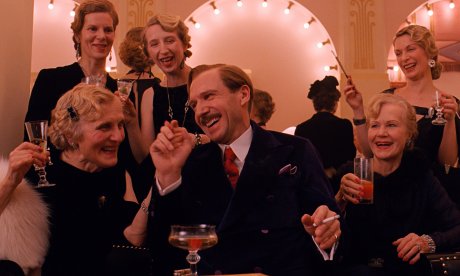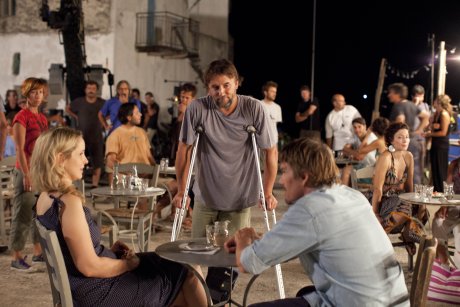Best Film Editing

TMT PICK: Barney Pilling (Grand Budapest Hotel)
Wes Anderson’s trademark attention to minute detail and photographic composition creates some pretty unique challenges for whoever is sitting in the editor’s chair, and Barney Pilling’s brilliant work in stringing together a remarkable number of particularly meticulous cuts is what really helped to set Anderson’s latest apart. Anderson likes using ensemble casts and employing a difficult mix of precise framing and loosely improvised work on the part of his actors. It’s what gives his films a bright, lively quality. It’s also extraordinary to think of the ways in which his editors pull it off. Pilling’s work kept the pacing of elaborate scenes impeccably taut, maintained a sense of visual continuity across a largely varied array of sequences, and was instrumental in creating Anderson’s tightest film to date. Say what you want about the movie itself; Grand Budapest Hotel is superbly edited.
Other Nominees:
• Tom Cross, Whiplash
• William Goldenberg, The Imitation Game
• Gary D. Roach, American Sniper
• Sandra Adair, Boyhood
Best Foreign Film

TMT PICK: Ida (Poland)
While fellow noms Leviathan and Timbuktu give it a run for the money, Ida soars visually. It’s beauty is in no small part due to a concise narrative, implemented elegantly. The Bergmanesque care to every frame is arresting, but never so painterly as to undermine its steady pacing. It’s daunting to articulate how perfect this film is. As with Bergman, you come away with a sour feeling, but you watch with a sense of wonder and, more significantly, true compassion for the suffering of the characters. This is a sure pick not because of originality (that’d be Timbuktu), for timeliness (Leviathan), or for having a humanitarian message (Tangerines), but because it is a triumph of economy of storytelling and sheer visual beauty. It is tasteful, yet sensual. Grim, yet lifeaffirming. Austere, yet vibrant. Ida is nothing short of a reclamation of that hoary cliche of timelessness, and deserves the win for it.
Other Nominees:
• Leviathan (Russia)
• Tangerines (Estonia)
• Timbuktu (Mauritania)
• Wild Tales (Argentina)
Best Original Screenplay

TMT PICK: Wes Anderson, Hugo Guinness (The Grand Budapest Hotel)
The glut of period dramas nominated each year provide the pretense of factual research to an audience ready to swallow a “true story” while consenting to a severe dearth of imagination. Few filmmakers are willing to both place themselves in history and write their way out of it. With his ever-increasing international prestige, Wes Anderson used the funds to internalize the writing of Austrian humanist Stefan Zweig — not to create a simple adaptation of his work, but to run wild with the class structures of pre-WWII Europe and fit them into a plot as mechanical as the machines that would later destroy it, all while couching that in a nesting-doll acknowledgement of his own writing process. He created an indelible protagonist in Gustave H., a bisexual libertine whose fondness for poetry and perfume never impeded his fancy for getting rich quick, and whose incongruous brotherhood with Zero while attempting to prove his own innocence was one of the most tragically lithe relationships he’d ever depicted. Once again, Anderson’s sleight-of-hand proved less formally subversive than thrillingly sincere.
Other Nominees:
• Dan Futterman, E. Max Frye, Foxcatcher
• Alexander Dinelaris, Nicolás Giacobone, Alejandro González Iñárritu, Armando Bo, Birdman
• Dan Gilroy, Nightcrawler
• Richard Linklater, Boyhood
Best Adapted Screenplay

TMT PICK: Paul Thomas Anderson (Inherent Vice)
When they’re not aiming for visual bravado, Paul Thomas Anderson’s films are some of the most verbally striking in American cinema, as ambitious salesmen, con artists and village idiots speechify toward ideals too big for one human canvas. In his first full-on adapted screenplay, Anderson transmutes the stoned paranoia and free association of Thomas Pynchon’s reference-heavy text, detailing an endless corporate conspiracy in 1970s Los Angeles navigated by one cluelessly persistent detective. Joanna Newsom’s narration lends a distinctly feminine, quasi-mythical sheen to Anderson’s cast of aggro-masculine pushers, charlatans, and doped-up sexpots. Following the thread of Pynchon’s dense ideological drift, Anderson retains the offbeat speech rhythms and selfish deliberations of his best characters, resulting in his loosest and most narratively dense film, and certainly one of his funniest. As an increasingly abstract object amid a sea of prestige pictures, it’s not likely to win any Oscars, but it was certainly more surprising and enthralling moment to moment, word by word, than the other nominees. “You mean the U.S. is, like, someone’s mom… and she’s strung out?”
Other Nominees:
• Jason Hall, American Sniper
• Graham Moore, The Imitation Game
• Anthony McCarten, The Theory of Everything
• Damien Chazelle, Whiplash
Best Original Song

TMT PICK: “Everything is Awesome” (The Lego Movie)
This category boiled down to two possibilities: “Glory” by Common and John Legend from Selma or “Everything Is Awesome” from The Lego Movie. As far as choices go, they are diametrically opposite, with one being an incredibly serious anthem for change and the other being a postmodern deconstruction of the modern pop song. Ultimately, divorced from their films, “Everything Is Awesome” is the better song. It succeeds at mocking a thing while also succeeding at being the thing it mocks. It is so catchy and infectious it makes sense the entire Lego world is obsessed with it while also pointing out the shallow depths to which songs like it plunge. The reassuring anthem of the status quo, manufactured just like the plastic people it entertains, it’s also a rollicking song that can be appreciated on its own merits. It’s an impressive one-two punch, proving satire works best when it works smartest.
Other Nominees:
• “Glory,” Selma
• “Grateful,” Beyond the Lights
• “I’m Not Gonna Miss You,” Glen Campbell: I’ll Be Me
• “Lost Stars,” Begin Again
Best Director

TMT PICK: Richard Linklater (Boyhood)
Shot in various locations in his native Texas over the course of 12 years, Linklater’s latest is a remarkably cohesive and engrossing narrative feature, made all the more impressive by the fact that he was making the film with children. Boyhood manages to draw us in from the first scene, establishing its compelling characters with the kind of economy that the director has been honing his entire career. Part of what made the film so exceedingly enjoyable to watch was Linklater’s shrewd decision to downplay as much as possible anything gimmicky in the manner in which the film was made. Instead to drawing attention to the progression of time — which would have been easy — Linklater’s primary concern is allowing his characters to develop their own stories and histories. It is a joy to watch, a remarkable entry in the history of American cinema.
Other Nominees:
• Wes Anderson, The Grand Budapest Hotel
• Alejandro G. Iñárritu, Birdman
• Bennett Miller, Foxcatcher
• Morten Tyldum, The Imitation Game
Best Picture

TMT PICK: Boyhood
The scent of the beanbag chair in our basement in Perrysburg, Ohio, upon which my brother played Goldeneye for hours without getting up to pee, instead wetting his pants, and how the controller faded from black to grey as he held onto that controller for dear life, afternoons collapsing into themselves, a small voice inside my mother saying, ‘Something is wrong with your son,’ and the delicious sensation of throwing his Nintendo64 into the trash when we fought over the television, so much fighting eventually forcing my mother to purchase not one but two high-speed fans for her bedroom so she could lock the door and blast that white noise to drown out the insults thrown back and forth between the two of four children she birthed. The secret kisses we exchanged, two Mormon siblings, four years apart, in the back of the family van as we drove from Northern Ohio to Southern Ohio to visit our grandparents, sweet incestuous kisses no one talks about, and the ways we explored each other’s bodies before they went to shit for other people. Boyhood is a movie about women, women who care for boys, boys related and unrelated, boys everywhere who have no clue how to stand up without the weight of a woman to carry them from a video game to a college to a job to an apartment to a grave. Boys with mothers and toy guns, and husbands sitting in corners who need the secret entrances of women to find their keys. Boyhood is a 12-year project that happens every 12 minutes in the back of 12 family vans driving to 12 houses as 12 brothers and sisters exchange 12 kisses and 12 touches and kill each other 12 times while playing Goldeneye for 12 consecutive days. Boyhood will produce 12 more Boyhoods until there are no more 12 years left for Richard Linklater.
Other Nominees:
• American Sniper
• Birdman
• The Grand Budapest Hotel
• The Imitation Game
• Selma
• The Theory of Everything
• Whiplash
